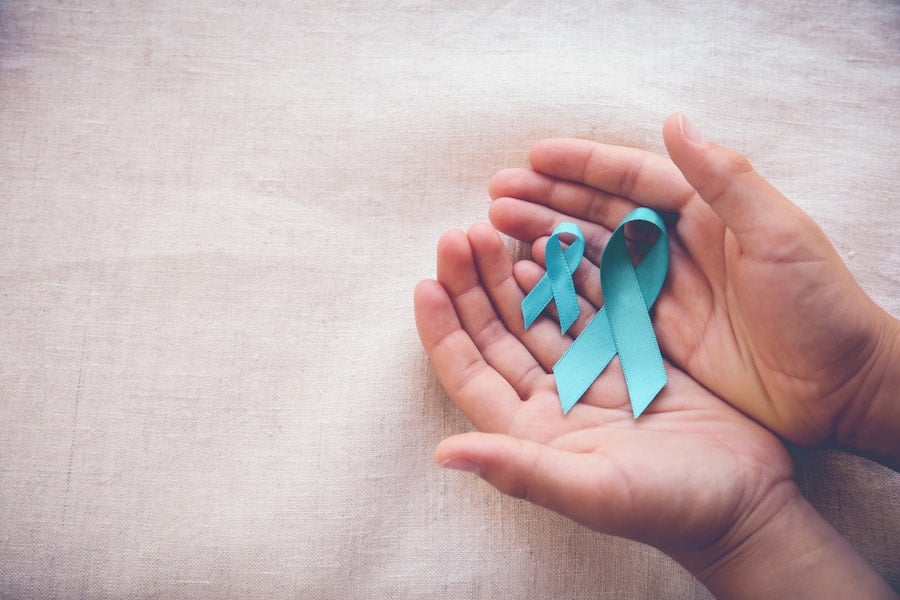World Ovarian Cancer Day: 7 risk factors every woman needs to know about
Ovarian cancer is relatively common – yet awareness and early diagnoses are still low.
Ovarian cancer is one of the most common female cancers, but many people don’t get a diagnosis until the cancer has spread.
This is partly due to the fact there’s no early detection test or national screening programme currently in place for ovarian cancer, and because many of the symptoms – such as bloating, abdominal pain and needing to pee more often than usual – are often overlooked or dismissed as being nothing to worry about.
#ovariancancer is the 7th most common cancer worldwide. We invite you to read Pamela’s story which underscores the importance of listening to your body. https://t.co/nXCbaaRpSk .#WOCD #OvarianCancerDay #ShareThePower @WorldOvarianCancerCo pic.twitter.com/iTeIpIEzml
— Ovarian Cancer Day (@OvarianCancerDY) May 6, 2019
Cancer Research UK say that currently, just 35% of women who are diagnosed with ovarian cancer survive for 10 or more years. That’s why it’s crucial that everybody knows the risk factors – this means things that may put you at an increased risk of developing the disease.
Here, Adeola Olaitan, consultant gynaecological oncologist at The Harley Street Clinic, part of HCA Healthcare UK (hcahealthcare.co.uk), highlights seven key ovarian cancer risk factors to keep in mind…
1. Age
“As with most illness and cancers in general, age can increase your chances of developing ovarian cancer. Epithelial ovarian cancer, the most common type, occurs most frequently in women between the ages of 75 and 79, but the risk increases substantially after the age of 50.”
#WorldOvarianCancerDay is coming on 8 May!Help us raise awareness of the symptoms of ovarian cancer – 4 out of 5 women cannot name bloating as a key symptom #WOCD
The symptoms are:❕Persistent bloating❕Feeling full❕Abdominal pain❕Needing to wee more often/more urgently
— TargetOvarianCancer (@TargetOvarian) May 3, 2019
2. Genetics
“Most ovarian cancers occur by chance, but in a small minority, it is because of an inherited predisposition. This accounts for around 5-15% of all cases diagnosed. The genes that increase the risk of this type of cancer include the BRCA1 and BRCA2 – faults in these genes are also linked to breast cancer.
“It’s important for women to know that having relatives who’ve had ovarian cancer does not necessarily mean they will too develop the cancer. Their relative’s cancer might have occurred by chance. However, women with a close relative (father, mother, brother or sister) who have been diagnosed with breast, ovarian or bowel cancer, are more at risk of ovarian cancer compared to those without any family history.
While our scientists are working hard in the lab to create a better future for women with ovarian cancer, we’re on the ground raising awareness by shouting as loudly as we can about the disease and its symptoms — but we can’t do it without you > https://t.co/vic9XAoi4V pic.twitter.com/bSmzqTgJdl
— OvarianCancerAction (@OvarianCancerUK) May 7, 2019
“Women at risk should be screened for a faulty gene, as they can then be advised about their cancer risk and measures that can be taken to reduce it.”
3. Previous cancer
“Women may have an increased risk of ovarian cancer if they have had certain cancers in the past. This is particularly the case for breast cancer and bowel cancer. The increased risk is likely to be linked to an inherited faulty gene, which is associated with a condition called Lynch syndrome.”
4. Hormone Replacement Therapy (HRT)
“Using Hormone Replacement Therapy after the menopause can increase your risk of ovarian cancer. HRT is linked to around 4 in every 100 cases of ovarian cancer in the UK.
“It is important that women know that this is a very small increased risk, and therefore, if HRT is alleviating potentially debilitating menopausal symptoms, then it is not worth being overly concerned about. I would always recommend that women should speak to their GP if they are concerned that they might have an inherited predisposition to ovarian cancer so they can receive specific advice.”
5. Smoking
“Smoking increases the risk of most illnesses, and cancers in particular. This is no different for ovarian cancer. If someone has smoked throughout their life, this will increase their risk of cancerous mutations occurring in the ovaries.”
Do you know the signs & symptoms of #ovariancancer? Join the movement and #ShareThePower of awareness. Retweet and tag your friends and family. For more information visit https://t.co/9LRBFd3ova #OvarianCancerDay #WOCD pic.twitter.com/IoggwkMWxA
— Ovarian Cancer Day (@OvarianCancerDY) May 6, 2019
6. Obesity
“Being overweight increases the risk of ovarian cancer. Therefore, it is important for women as they get older to try to maintain a healthy weight to mitigate against this risk.”
7. Other medical conditions
“Research has found that for women with endometriosis or diabetes may have an increased risk of developing ovarian cancer.”
The Press Association
Latest posts by The Press Association (see all)
- How to attract more bees to your garden - May 3, 2024
- The costly insurance pitfalls to avoid when kitting out your garden this summer - May 3, 2024
- Gavin And Stacey’s best moments: From Smithy’s Indian takeaway to Pam eating ham - May 3, 2024
- Princess Charlotte ‘s ninth birthday marked by picture release - May 2, 2024
- Strong passwords more important than ever, experts warn - May 2, 2024





















